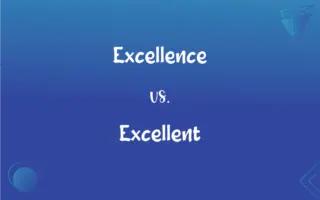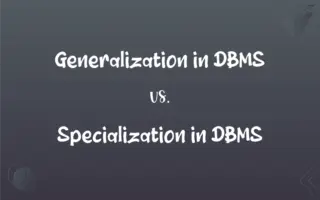Recruitment vs. Selection: What's the Difference?
Edited by Janet White || By Harlon Moss || Updated on October 24, 2023
Recruitment involves attracting potential candidates to apply for a position, while selection is the process of choosing the best-suited individual from those candidates.

Key Differences
Recruitment is the initial phase in the hiring process, where organizations actively seek and attract potential candidates to apply for job openings. The main goal of recruitment is to have a broad pool of applicants from which to choose. On the other hand, selection represents the subsequent phase, where these candidates are evaluated and filtered based on specific criteria, ultimately leading to the hiring of the most appropriate individual for the position.
Recruitment typically involves advertising job openings, promoting the company's brand as an employer, and using various channels to reach potential candidates. This could include job boards, career fairs, or recruitment agencies. Selection, conversely, narrows down the pool by utilizing methods like interviews, tests, and background checks to ensure that the candidate aligns with the job requirements and company culture.
While recruitment is about casting a wide net and ensuring a high volume of applicants, selection is more focused and strategic. It's about finding the right fit. Recruitment might generate interest and encourage applications, but it's the selection process that determines if an applicant is truly suitable for a role. It's crucial for both processes to be effective to ensure that the best candidate is brought onboard.
In recruitment, the emphasis is often on speed and efficiency in gathering a significant number of applicants. This is essential to ensure that there's enough choice when moving to the selection phase. Selection, however, prioritizes thoroughness and accuracy, as making a wrong choice can be costly in terms of time, resources, and productivity.
Comparison Chart
Purpose
Attract potential candidates.
Choose the best candidate from the pool.
ADVERTISEMENT
Stage in Hiring
Initial phase.
Subsequent phase.
Emphasis
Volume of candidates.
Quality and fit of candidates.
Methods Used
Job advertisements, career fairs, etc.
Interviews, tests, background checks, etc.
Outcome
Large pool of applicants.
Final hiring decision.
Recruitment and Selection Definitions
Recruitment
A systematic approach to find suitable candidates for a role.
The HR team is in charge of recruitment for all departments.
ADVERTISEMENT
Selection
The act of picking out or making a choice.
The committee's selection was based on merit.
Recruitment
The process of inviting job seekers to apply for positions.
The company's recruitment drive attracted hundreds of applicants.
Selection
A systematic method to filter and hire a candidate.
The final step in the selection process was the panel interview.
Recruitment
The act of drawing potential candidates for a job.
Online platforms have revolutionized recruitment strategies.
Selection
Evaluating and deciding on the most suitable individual.
The selection criteria included experience and qualifications.
Recruitment
The strategy of gathering a pool of individuals for a position.
Their recruitment methods are known to be innovative and effective.
Selection
The process of choosing the best candidate from a group.
The selection process was thorough and rigorous.
Recruitment
The action of searching and attracting job aspirants.
Effective recruitment is key to the growth of an organization.
Selection
The determination of the right fit for a position.
Proper selection ensures a harmonious work environment.
Recruitment
To enlist (persons) in military service.
Selection
The act of selecting something
Looked at the pears and made a careful selection.
FAQs
What does selection mean?
Selection involves choosing the most suitable candidate from those who have applied for a job role, after considering their qualifications, experience, and overall match with the company's needs.
How do recruitment and selection differ?
Recruitment is the process of finding and encouraging prospective employees to apply for a job, while selection is the process of evaluating candidates' qualifications and choosing the best fit for the position.
What is the definition of recruitment?
Recruitment refers to the overall process of attracting, shortlisting, selecting, and appointing suitable candidates for jobs within an organization.
Are recruitment and selection only applicable to permanent roles?
No, recruitment and selection processes apply to temporary, part-time, contract-based, and permanent roles alike.
What is the first step in the recruitment process?
The first step typically involves identifying the vacancy and defining the role or position, including qualifications, experience, and skills required.
Can social media be used for recruitment?
Yes, social media platforms are increasingly used for recruitment, known as social recruiting, to reach a broader and more diverse audience.
What are common selection methods?
Common methods include resume screening, interviews (phone, video, or in-person), skill tests, psychometric assessments, and reference checks.
Who is responsible for recruitment and selection in an organization?
Usually, the Human Resources department manages these processes, but depending on the organization's size and structure, hiring managers or external recruitment agencies might also be involved.
Is it necessary to provide feedback after the selection process?
It's considered good practice but not always mandatory. Constructive feedback helps candidates improve and maintains a positive image of the organization.
What is 'passive recruitment'?
Passive recruitment involves sourcing candidates who may not be actively seeking a new job but have the qualifications and experience desired by an employer. This approach often requires headhunting or networking.
What is 'internal recruitment'?
Internal recruitment involves filling vacancies with existing employees from within the organization rather than sourcing candidates externally.
Do recruitment and selection processes have legal considerations?
Yes, processes must comply with employment laws, which can include regulations against discrimination, rules for fair labor practices, data protection laws, and more.
How do companies ensure unbiased recruitment?
Companies use strategies like structured interviews, blind resume reviews, and diverse hiring panels to mitigate bias and promote fairness in recruitment.
Why is diversity important in recruitment and selection?
Diversity introduces various perspectives, fosters innovation, and reflects a multicultural customer base. It also promotes inclusivity and equal opportunity.
Can recruitment and selection be outsourced?
Yes, many companies outsource these processes to recruitment agencies or consultants who specialize in finding and screening candidates.
What role does technology play in recruitment and selection?
Technology streamlines these processes, making them more efficient. It facilitates the electronic dissemination of job postings, online applications, virtual interviews, and digital skills assessments.
How do recruitment and selection processes affect an organization's brand?
These processes significantly impact an employer's brand as they shape the candidates' perception of the company's culture, professionalism, and values.
How long does the selection process take?
The duration varies by company, position, industry, and the number of applicants, among other factors. It can range from a few days to several months.
What's an applicant tracking system (ATS)?
An ATS is software used by hiring professionals to collect, sort, scan, and rank job applications in the recruitment process.
Why is effective recruitment important?
Effective recruitment ensures an organization attracts qualified candidates, promotes diversity, supports its long-term goals, and maintains its culture and performance standards.
About Author
Written by
Harlon MossHarlon is a seasoned quality moderator and accomplished content writer for Difference Wiki. An alumnus of the prestigious University of California, he earned his degree in Computer Science. Leveraging his academic background, Harlon brings a meticulous and informed perspective to his work, ensuring content accuracy and excellence.
Edited by
Janet WhiteJanet White has been an esteemed writer and blogger for Difference Wiki. Holding a Master's degree in Science and Medical Journalism from the prestigious Boston University, she has consistently demonstrated her expertise and passion for her field. When she's not immersed in her work, Janet relishes her time exercising, delving into a good book, and cherishing moments with friends and family.







































































